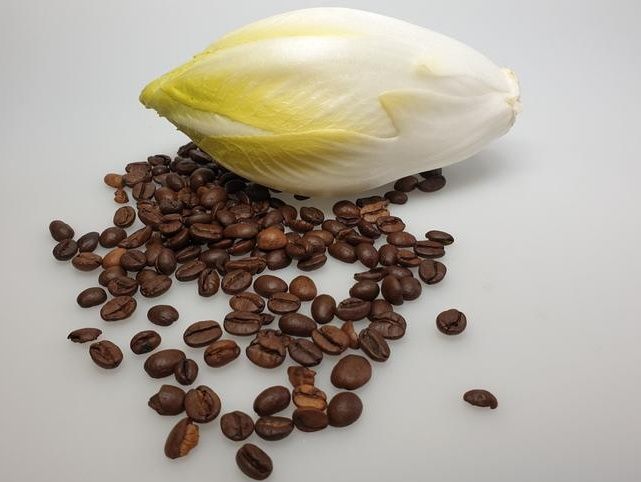Chicory, surrogate and roasted coffee provide new insights into mechanisms of taste perception
Advertisement
The composition of foodstuffs, but also the sequence of dishes, is important for the perfect taste experience of a menu. This insight, based on experience, is well known. The molecular causes of the pleasure-enhancing effects, on the other hand, are still poorly understood. Using the example of chicory, surrogate and roasted coffee, a study by the Leibniz Institute for Food Systems Biology at the Technical University of Munich (LSB) now explains for the first time why the order in which we eat food can be decisive for bitter taste perception and what role bitter taste receptors play in this process.

Chicory and roasted coffee contain different bitter substances
Dr. Gisela Olias / LSB
Chicory (Cichorium intybus L.) is a popular salad ingredient, and its bitterness harmonizes well with apples or balsamic vinegar. The roasted and ground bitter roots of the plant, on the other hand, contribute to the flavor similarity to roasted coffee in many coffee substitutes. The reason for this, however, is not clear. To investigate this question and learn more about the molecular basis of taste perception, the research team led by Maik Behrens, head of the Taste & Odor Systems Reception group at LSB, conducted extensive experiments.
Three bitter taste receptor types identified for chicory
The experiments focused on the three main known bitter substances present in chicory and chicory root-containing surrogate coffee. To determine which human bitter taste receptor types they activate, the team used an established cellular assay system.
As the test results show for the first time, the chicory bitter compounds activate only three of the approximately 25 bitter taste receptor types. However, these belong to the group of five receptor types identified to date that respond to bitter substances in roasted coffee. "Chicory bitter compounds thus exhibit a receptor activation profile that overlaps with those of the roasted coffee compounds tested to date and appear to mimic the bitterness of roasted coffee well. However, the profiles are not completely identical," says Tatjana Lang of the LSB, who was substantially involved in the study.
It's the sequence that counts
To check the extent to which the similarities and differences in the receptor activation profiles affect taste perception, the team also conducted sensory tests. If the test subjects evaluated roasted coffee shortly before eating chicory or drinking a coffee substitute, both foods tasted significantly less bitter than before. Conversely, consumption of chicory or surrogate coffee did not affect the perceived bitterness of a subsequently tasted roasted coffee.
"Our results suggest that the bitter substances of roasted coffee briefly make all three bitter taste receptor types that respond to chicory compounds less sensitive to the latter. Conversely, this debittering effect does not work, as presumably the chicory bitter substances are not able to desensitize all receptor types that detect bitter compounds in roasted coffee," explains Roman Lang, who heads the Biosystems Chemistry & Human Metabolism group at LSB.
"Ultimately, our results suggest that precise knowledge of the receptor activation profiles of bitter compounds could in principle be used to predict or positively modulate the taste perception of foods," adds principal investigator Maik Behrens. "Moreover, it can be assumed that such effects are not limited to the perception of bitter substances. Therefore, there is still much to be explored to understand the molecular mechanisms underlying complex taste sensations."























































